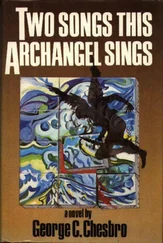“I should have seen that,” Axel said when he returned. “If you’d kept in touch with me over the summer, if we’d been talking about your experimental design … I should have seen that before Duncan did.” Sam couldn’t tell whether Axel was more angry at himself for missing it or proud of having taught Duncan so well.
In the wake of that paper, Sam knew he wouldn’t be welcome at Columbia, where everyone had assumed he’d follow Axel and Duncan to graduate school. But with Axel’s help he found a place in a small program in Wisconsin, run by a sound but middling geneticist. Not one of Morgan’s golden boys, like Bridges or Sturtevant; not even someone at the top of the second tier (which was how Axel disparagingly characterized himself), but a man who knew he was lucky to have a lab and the funding for a few graduate students.
Sam spent that last summer in Axel’s lab, maintaining the cultures and leaving everything in order for Axel’s next helper, wishing, all the time, that he could be discussing new projects with Axel. But Axel, collaborating with a friend in Texas, was seldom there, and Ellen, who might have helped him settle into his new life, instead did the reverse. If she’d gotten pregnant during his last year of college, nothing, Sam knew, could have wedged them apart — but she didn’t, and didn’t, and when summer came and she still wasn’t pregnant, they didn’t see each other for several months. In August, she backed out of her offer to drive to Wisconsin with him and went to Woods Hole instead. Before Thanksgiving, she was gone.
For a long time, Sam was able to avoid her. His luck ran out after seven years, at a big meeting in Washington where Duncan received a prestigious award. Sam was moving toward the back of the auditorium, having just heard a talk by a maize geneticist and hoping to escape before Duncan spoke. He ran into Ellen in the middle of the aisle, herding two boys and a girl, all resembling Duncan in some way, toward the special seats at the front set aside for the prizewinner’s family. She introduced the children awkwardly and asked how Sam was doing.
“Fine,” Sam said. “Just finishing my thesis.” She and Duncan had married before he’d even started that work. After which Axel, as if inspired by them, had married a mathematician he’d met in Texas, moved to a leafy street twenty minutes from the college, and promptly produced a son.
“We miss you at Woods Hole,” she said.
“Handsome boys,” he said, avoiding their eyes.
Tugging at her younger son’s collar, bending to adjust the skirt on her dark-haired little girl, Ellen said that she and Duncan went back every year, always with the children, who loved it. But nothing had ever been as wonderful as her second summer there. When, Sam knew by then, she’d already left him but he didn’t know it. When she and Duncan had both returned and Sam, in the shadow of his big failure, had been unable to join them.

ON THE LIFEBOAT, before the sun rose, when the night was at its coldest and the waves were tossing them about and when, having long since thrown up everything he’d eaten the previous day, Sam was retching painfully and Bessie’s hand was lightly patting the back of his neck, he had thought about his calm hand bringing the needle’s point so lightly, so deftly, to each Drosophila eye. How the flies’ wounds had sometimes stuck to the food, and to each other; how those that lived were weak for several days, some unable to eat. Here on the ship, shaken about like a fly in a test tube, he too was having trouble eating. One evening he learned that while most of the geneticists who’d been on the Athenia with him had been picked up by the British destroyers, two were apparently lost. And on the eighth day of the crossing, while he scored patterns in the oatmeal that was one of the few things left to eat, Sam learned that the little girl who’d been in a coma had finally died.
Gloom spread through the ship as each seating heard the news, and later Sam saw Bessie, near the bow, comforting her son, Aaron, who was crying. He and the girl had been friends, Sam thought, or at least known each other the way children even of different ages do when confined together. He couldn’t stop himself from walking over to Aaron and squatting down beside him. He rested his hand on Aaron’s back, his fingertips moving gently.
“Shh,” he said. “It’s all right.” Which was what he’d said in the boat, when Aaron was so cold and sick that he was crying. Also this was what Bessie had said to Sam. Now she said, “He’s taking this very hard.”
“Were they close?” Sam asked. The two geneticists who’d drowned, husband and wife, had worked at a small Minnesota college and traveled only rarely to international gatherings. Sam hadn’t met them at the congress, but he had on the ship, and he’d envied them when they came down hand in hand to what would be their last dinner. Axel had said, at that same meal, how much he’d been missing his wife and son.
“She used to take him for walks around the deck, when she was bored,” Bessie said, gesturing toward their own crowded railings, so packed with passengers eager for air — they were expecting rain — that strolling was out of the question. “They played make-believe. You know, the way children will: I’ll be the mommy and you be the little boy, and I’ll get you ready for school …”
“She sounds sweet,” Sam said. The figures crowding the railings separated, moved together again, bunched, and dispersed, long lines forming only to condense into shorter segments.
“Not always — once she pinched him hard enough to leave a mark.”
Aaron shrugged off Sam’s hand and pushed himself more firmly into Bessie’s legs. “Do you have children?” she asked, smoothing her son’s hair.
“I don’t,” Sam said, and if Duncan and Harold hadn’t joined them just then, he might have told Bessie how pained he’d been when he understood that he likely never would have any. Ellen, who couldn’t get pregnant with him, had gotten pregnant instantly with Duncan; no woman he’d been with since had had so much as a scare. Sometimes, when he’d had too much to drink (throughout Prohibition, he and his friends had always had access to lab ethanol), he used to joke around with a toothpick-and-gumdrop figure he called Mr. Heredity. Look at me! he’d have the figure say . Interested since childhood in how we inherit traits, but I can’t reproduce! But although he laughed as hard as anyone when Mr. Heredity drooped his gumdrop head, later, when he began to grasp the fact that no one would ever have his hair or his blocky nose, his height or his big hands, he felt quite otherwise. The day his heart stopped, the day he got hit by a bus (the day a torpedo sank the ship that was taking him home), everything that had led to his father and mother and converged in him would be extinguished.
But here were his colleagues, bearing down. He managed a smile as they greeted him and, looking at Bessie and Aaron, asked if they could do anything to help. Sam introduced them only by name, without explaining how he knew them.
“We’re fine,” Bessie said.
Impossible to focus on her and Duncan at the same time. Instead, Sam kept his eyes on the unusually turbulent sky. Great soft gray clouds piled one atop the other, pushing each other aside like wrestling dogs.
Bessie said, looking only at him, “Margaret’s death made Aaron miss his father more than usual. He keeps thinking something’s happened to him, that he won’t be there when we get home. Those men we saw in the water …” She picked Aaron up and left.
Duncan watched them walk away and then turned back to Sam, eyes bright with curiosity. “You were in the same lifeboat?”
Читать дальше













